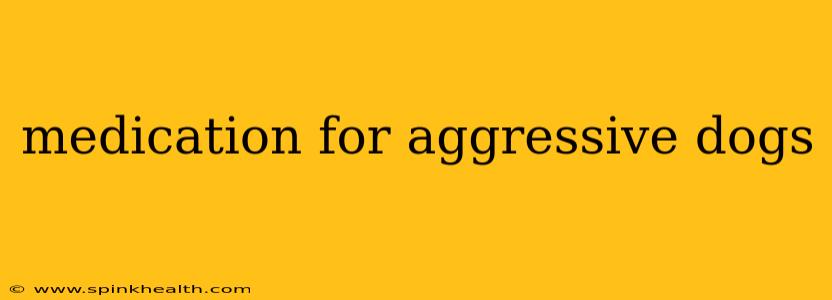Aggression in dogs can be a deeply concerning issue for owners, impacting both the dog's well-being and the safety of those around them. Understanding the root causes of aggression and exploring appropriate management strategies is crucial. While medication isn't always the answer, it can be a valuable tool in a comprehensive treatment plan when used correctly under veterinary guidance. This guide delves into the world of medication for aggressive dogs, offering insights and addressing common questions.
My name is Dr. Emily Carter, and I've been a practicing veterinarian for 15 years, specializing in canine behavior. I've witnessed firsthand the transformative power of a holistic approach to managing canine aggression, combining medication with behavioral modification. This article reflects my professional experience and commitment to responsible pet ownership.
What Causes Canine Aggression?
Before we dive into medication, it's vital to understand that aggression isn't a single problem with a single solution. It's a complex behavior stemming from various underlying factors. These can include:
- Fear-based aggression: This is arguably the most common type, where the dog feels threatened and responds aggressively to perceived danger.
- Territorial aggression: Dogs might display aggression to protect their home, food, toys, or even their owner.
- Possessive aggression: This involves guarding resources like food, toys, or even people.
- Pain-related aggression: A dog experiencing pain might snap or bite out of discomfort or fear.
- Dominance aggression (a debated term): Often misinterpreted, this is less about dominance and more about a lack of proper socialization and training.
- Predatory aggression: This instinctive behavior is triggered by the sight or presence of prey.
What Medications Are Used to Treat Canine Aggression?
Several classes of medications can help manage aggression in dogs. It's crucial to remember that only a veterinarian can diagnose the cause of aggression and prescribe appropriate medication. Self-treating can be dangerous and ineffective. Commonly used medications include:
- Antidepressants (SSRIs and TCAs): These medications help regulate serotonin and other neurotransmitters that influence mood and behavior. They're often used to address fear-based aggression and anxiety. Examples include fluoxetine (Prozac) and clomipramine (Clomicalm).
- Anxiolytics (Benzodiazepines): These medications are used to reduce anxiety in short-term situations, such as during thunderstorms or vet visits. They are not typically used for long-term management of aggression. Examples include diazepam (Valium) and alprazolam (Xanax).
- Other Medications: In some cases, veterinarians might prescribe other medications, such as anticonvulsants or other drugs targeting specific neurological conditions that contribute to aggression.
How Long Does it Take for Medication to Work?
The effectiveness and timeframe of medication vary depending on the dog, the type and severity of aggression, and the chosen medication. It can take several weeks, even months, to see a noticeable improvement. Patience and consistent administration are key. Regular veterinary checkups are essential to monitor the dog's response to treatment and adjust the medication as needed.
Are There Any Side Effects of Medication for Aggressive Dogs?
Like all medications, those used to treat canine aggression can have side effects. These can vary depending on the specific drug and the dog's individual response. Common side effects might include:
- Gastrointestinal upset: Nausea, vomiting, diarrhea.
- Lethargy: Increased sleepiness or fatigue.
- Changes in appetite: Increased or decreased appetite.
- Increased thirst or urination.
- Weight changes.
It's crucial to report any unusual side effects to your veterinarian immediately.
What is the Role of Behavior Modification?
Medication is only one part of a comprehensive treatment plan. Behavior modification is equally, if not more, important. A certified veterinary behaviorist or a qualified professional dog trainer can help develop a tailored behavior modification program that addresses the root causes of the aggression. This might involve training techniques like counter-conditioning, desensitization, and positive reinforcement.
Can Medication Cure Canine Aggression?
Medication doesn't "cure" aggression; it helps manage the symptoms. It's a valuable tool when used in conjunction with behavior modification. The goal is to improve the dog's quality of life and make them safer to be around.
What if Medication Isn't Effective?
If medication isn't producing the desired results, it's crucial to consult with your veterinarian. They may adjust the medication, suggest a different drug, or recommend further diagnostic testing to identify other underlying health conditions. A reassessment of the behavior modification plan is also vital.
Remember, responsible dog ownership involves seeking professional veterinary help for any behavioral issues. Early intervention is key to achieving the best outcomes. Your veterinarian is your first and most important resource in addressing canine aggression.

